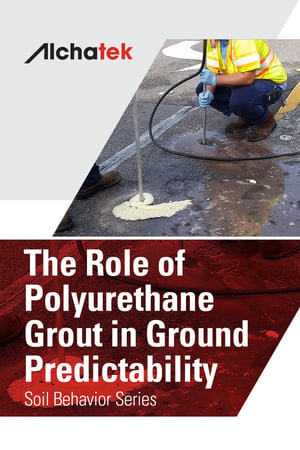
 In the complex field of geotechnical engineering, understanding the behavior of the ground is a challenging but essential task. One effective tool for soil stabilization and ground treatment is the use of polyurethane grouts. This article discusses how polyurethane grouts have become a valuable tool for enhancing soil predictability and addressing various geotechnical challenges.
In the complex field of geotechnical engineering, understanding the behavior of the ground is a challenging but essential task. One effective tool for soil stabilization and ground treatment is the use of polyurethane grouts. This article discusses how polyurethane grouts have become a valuable tool for enhancing soil predictability and addressing various geotechnical challenges.
What is Polyurethane Grout?
Before exploring its applications, it's helpful to understand what polyurethane grout is:
- Composition: Polyurethane grouts are man-made polymers that react with moisture when injected into soil, expanding and hardening into a stable, water-resistant mass.
- Versatility: Different formulations of these grouts are available, making them adaptable to various soil conditions and stabilization needs. Both hydrophobic and hydrophilic versions exist, providing further flexibility.
Soil Stabilization
One of the main uses of polyurethane grouts is to improve the stability of soil:
- Filling Voids: Voids in the ground can lead to structural instability. Polyurethane grouts expand to fill these gaps, aiding in maintaining ground stability.
- Compaction Grouting: In areas with loose soils, these grouts can be applied for compaction, resulting in a more stable ground and reducing the likelihood of future settlement.
- Improving Cohesion in Sandy Soils: Polyurethane grout is especially effective in sandy terrains, which often lack natural cohesion. The grout helps bind the soil particles together, reducing the risk of shifting.
Water Management and Sealing
Besides stabilization, polyurethane grouts are also useful for water management:
- Water Cut-offs: Unplanned water ingress at construction sites can be a concern. These grouts create a water-resistant barrier, effectively cutting off unwanted water pathways.
- Sealing Leaks: These grouts are valuable for sealing leaks in underground structures like tunnels and basements, ensuring the structures remain watertight.
- Preventing Soil Liquefaction: By reducing soil permeability, polyurethane grouts can lower the risk of soil liquefaction, which is particularly relevant in seismic zones.
Environmental Considerations
Polyurethane grouts offer some environmental advantages:
- Reduced Excavation: Traditional stabilization methods often involve extensive digging, which can affect the local ecosystem. Grouting requires less excavation, reducing the environmental impact.
- Aquifer Protection: Contaminating groundwater is a serious concern. Polyurethane grouts can assist by sealing off potential sources of contamination.
- Site Reclamation: Contaminated or disturbed sites can be rehabilitated more effectively due to the barrier properties of these grouts.
Interactions with Various Soil Types
The performance of polyurethane grouts can vary depending on soil conditions:
- Clayey Soils: These grouts can modify the properties of clay soils, making them less susceptible to water absorption and subsequent expansion.
- Silty Terrains: In silty conditions, the grouts help in binding the fine soil particles, thus improving overall stability.
- Rocky Formations: In rocky terrains, polyurethane grouts can act as sealants for fissures or cracks, enhancing structural safety.
Expanding Applications
The utility of polyurethane grouts extends beyond conventional uses:
- Heritage Preservation: Historical structures can benefit from soil stabilization techniques that employ these grouts.
- Agricultural Use: These grouts can be beneficial for improving soil stability and water retention in agricultural settings.
- Innovative Construction: Whether it's constructing in challenging terrains or developing underground spaces, polyurethane grouts offer several possibilities.
Polyurethane grouts have become a dependable tool in the realm of geotechnical engineering. With their adaptability and effectiveness, they play a positive role in soil stabilization and ground treatment. As construction projects continue to evolve, these grouts will likely be increasingly useful in ensuring the stability and security of our built environment.


